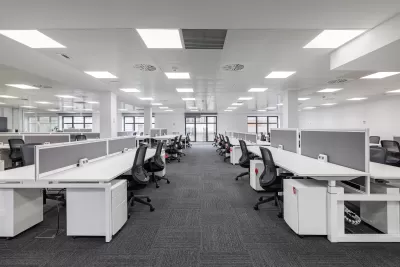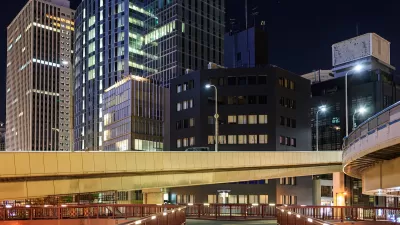To encourage more housing production, lawmakers could help make the costly and time-consuming adaptive reuse process easier and more cost-effective.

During the height of the Covid-19 pandemic, the potential for converting offices, hotels, malls, and other commercial buildings to housing became a hot topic as occupancy rates in office buildings plummeted and, in many cases, have remained low as the pandemic wanes. With office vacancy rates at a 30-year high, developers and housing advocates saw the possibility in adaptive reuse to create a win-win situation amidst a deepening housing crisis.
As Erika Bolstad explains in Next City, the conversion of offices to housing is more complicated and expensive than it seems at first glance, but new legislation at the local, state, and federal levels could make the process easier and less costly.
In Oregon, legislation proposed by Rep. Pam Marsh would “would require the state’s larger cities to allow commercial-to-residential conversions without mandating zoning changes or conditional use permits” and local governments to waive development fees. “In California, state Assemblymember Matt Haney, a Democrat from San Francisco, introduced legislation to bar local officials from delaying or denying commercial-to-residential projects.” Washington, D.C. developers can receive a 20-year tax abatement for commercial-to-housing projects.
Despite the efforts made by states and cities, office conversion remains “a fringe trend at best,” for now, but recent legislative changes could tip the balance in favor of more conversions.
FULL STORY: Converting Offices To Housing Is Hard. These Changes Could Make It Easier.

Maui's Vacation Rental Debate Turns Ugly
Verbal attacks, misinformation campaigns and fistfights plague a high-stakes debate to convert thousands of vacation rentals into long-term housing.

Planetizen Federal Action Tracker
A weekly monitor of how Trump’s orders and actions are impacting planners and planning in America.

In Urban Planning, AI Prompting Could be the New Design Thinking
Creativity has long been key to great urban design. What if we see AI as our new creative partner?

King County Supportive Housing Program Offers Hope for Unhoused Residents
The county is taking a ‘Housing First’ approach that prioritizes getting people into housing, then offering wraparound supportive services.

Researchers Use AI to Get Clearer Picture of US Housing
Analysts are using artificial intelligence to supercharge their research by allowing them to comb through data faster. Though these AI tools can be error prone, they save time and housing researchers are optimistic about the future.

Making Shared Micromobility More Inclusive
Cities and shared mobility system operators can do more to include people with disabilities in planning and operations, per a new report.
Urban Design for Planners 1: Software Tools
This six-course series explores essential urban design concepts using open source software and equips planners with the tools they need to participate fully in the urban design process.
Planning for Universal Design
Learn the tools for implementing Universal Design in planning regulations.
planning NEXT
Appalachian Highlands Housing Partners
Mpact (founded as Rail~Volution)
City of Camden Redevelopment Agency
City of Astoria
City of Portland
City of Laramie





























